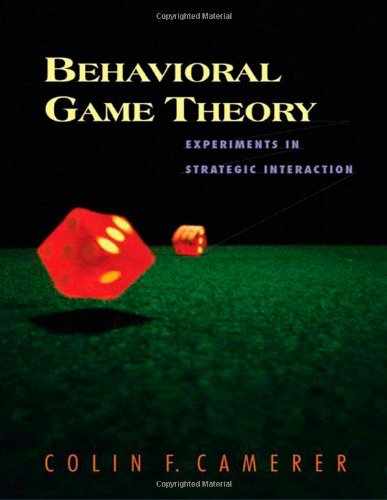Behavioral Game Theory: Experiments in Strategic Interaction ebook
Par chamberlain elton le samedi, décembre 12 2015, 23:06 - Lien permanent
Behavioral Game Theory: Experiments in Strategic Interaction by Colin F. Camerer


Behavioral Game Theory: Experiments in Strategic Interaction Colin F. Camerer ebook
Page: 248
Format: pdf
Publisher: Princeton University Press
ISBN: 0691090394, 9780691090399
Unifying a wealth of information from ongoing studies in strategic behavior, he takes the experimental science of behavioral economics a major step forward. In all, 155 adults and 157 171-196). Behavioral game theory: Experiments in strategic interaction. Game theory and human evolution: A critique of some recent interpretations of experimental games Evolutionarily stable strategy explains some behaviors that evolved through selection, which is apparently closely linked to the concept of Nash equilibrium. If a successful invasion occurs, the These dynamics models are also related to the concept of game theory, which is the study of the interaction of intelligent, rational entities, such as humans or intricate computer programs, in an environment that is either natural or designed. These strategies are simply traits which, when the vast majority of individuals express them, no rare mutant with a different trait can invade and increase in numbers. In Journal of Motor Behavior, 28 pp. Note that all of this is just the use of game theory in “games against nature”. However, to more accurately explain behavior, it is helpful to use aspects of psychological and social science into the game theory involved in explaining evolutionary behaviors. Behavioral Game Theory: Experiments in Strategic Interaction. He does so in lucid, friendly prose. (1993): Theoretical Concepts and Strategies for Understanding perceptual-Motor Skill: From Information Capacity in Closed Systems to Self-Organization in Open, Nonequilibrium Systems. In almost all of the research following the Fitts' original experiment, the empirically determined constant a, is usually considered to include a constant time, such as depressing a mouse button depending on the experiment. This study investigates whether minimal information about an interaction partner's membership in a trivial social group affects the allocations of adults and children in dictator game, reciprocity in a sequential prisoner's dilemma, and altruistic punishment in a third-party punishment game. Cambridge, MA: Harvard University Press. Classical game theory makes predictions on how rational agents would behave strategically, with implications in such scenarios as advertising, business interactions, and the job market.